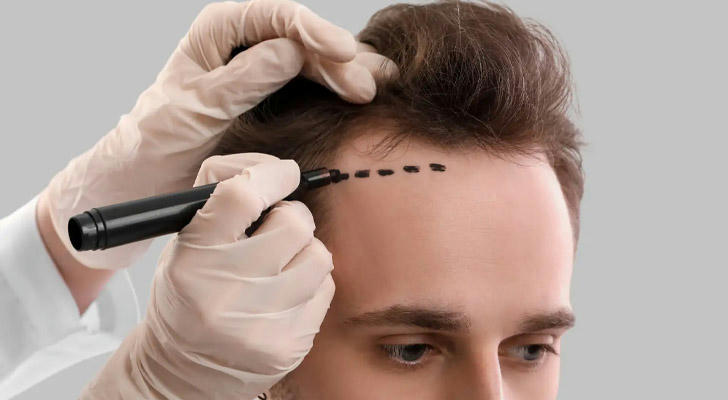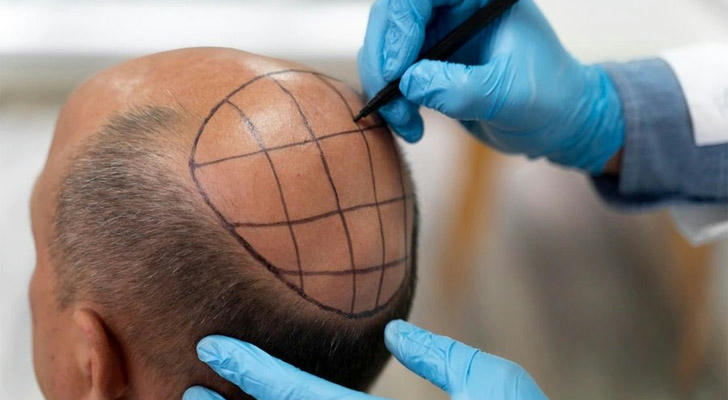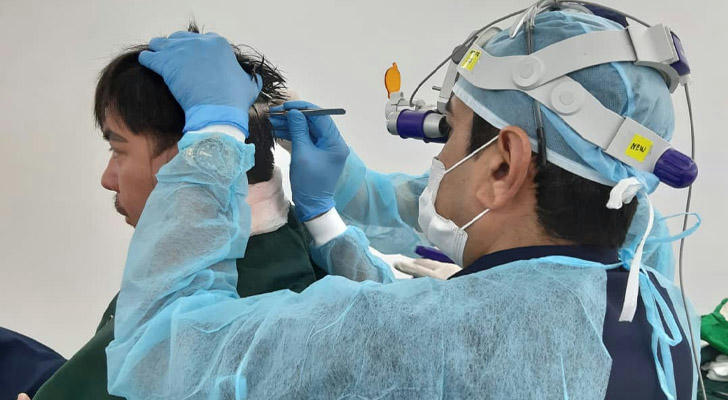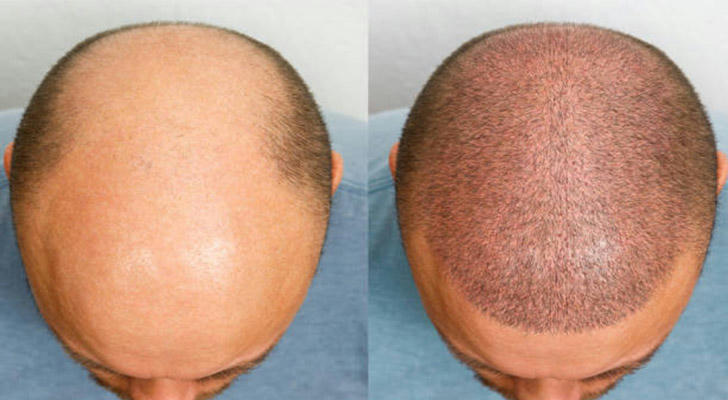Common Problems In Hair Transplantation Surgery

Hair transplant surgery, as an effective means to solve the problem of hair loss, has helped countless patients regain their confidence and appearance. However, this surgery is not without risks and challenges. This article will explore in depth the common problems that may be encountered in hair transplant surgery and their solutions, and provide detailed information and guidance through case analysis.

I.Precautions for preoperative preparation for hair transplant surgery
1.Health assessment: Before surgery, the doctor will perform a dermoscopy or trichoscope examination to magnify the scalp and hair follicles, evaluate the health of the hair follicles and the growth cycle of the hair in the donor area, and ensure that there is no inflammation or infection.
2.Routine examination: Perform blood tests to evaluate coagulation function, anemia, and whether there are infectious diseases to ensure that the patient is suitable for surgery.
3.Medication adjustment: If the patient is using hair growth drugs such as finasteride or minoxidil, it may be necessary to stop using them for a period of time before surgery. In particular, minoxidil, because its vasodilating effect may increase intraoperative bleeding, is usually recommended to be discontinued 2 weeks before surgery. Other drugs that may affect coagulation, such as aspirin, should also be discontinued in advance.
4.Shaving and shampooing: Although not all patients need to shave their hair, shaving can make the operation more convenient and improve the quality and survival rate of hair follicles. The hair should be thoroughly washed the night before the hair transplant, because it is not suitable to wash the hair for a period of time after the operation.
5.Choice of surgical method: Patients need to discuss with the doctor and choose the hair transplantation technology that best suits their situation, such as FUT (follicular unit transplantation) or FUE (follicular unit extraction), and whether to use more sophisticated technology such as hair transplant robot or long hair transplant.
6.Adjustment of lifestyle habits: Before the operation, bad habits such as staying up late and drinking should be avoided, the scalp should be kept dry and clean, and makeup and menstruation should be avoided on the day of the operation.
II.Recovery time after hair transplantation surgery
The recovery period after hair transplantation surgery varies according to different individuals and surgical techniques, but the following stages can generally be expected:
1.Initial recovery (within 1 week after surgery)
In the first few days after the hair transplantation surgery, patients should avoid contact with moisture at the surgical site to prevent infection. Do not wash your hair for about three days after the operation, and avoid bowing your head for a long time to reduce swelling of the head. If there is a small amount of bleeding or exudate, it is normal. After the operation, oral anti-inflammatory drugs should be taken as prescribed by the doctor to prevent infection.
2.Scabbing and scab-falling period (1 to 3 weeks after surgery)
Small blood scabs will form at the transplant site within a few hours after hair transplantation, and these blood scabs will fall off by themselves within 1 to 3 weeks. On the fourth day after surgery, you can start to wash your hair gently, use mild shampoo products, and avoid picking, rubbing, and scratching the transplanted area.
3.Swelling subsides (about 1 week)
Due to the swelling fluid injected during surgery, facial swelling may occur after surgery. Usually, the swelling fluid is absorbed within 3 to 5 days, and the swelling gradually subsides.
4.Nerve recovery (about 1 month)
The cutaneous nerves may be damaged during hair transplantation, causing itching and numbness of the scalp. These symptoms of most patients can be gradually relieved within about 1 month.
5.Complete recovery (about 1 month)
About 1 month after hair transplantation, patients can resume normal hair washing, but they need to be gentle with the transplanted area
6.Shedding period (about 3 months after surgery)
About 3 months after hair transplantation, hair may fall out in the transplanted area. This is normal and temporary. New hair will grow out in the following months.
7.Growth period (4 months to 1 year after surgery)
Starting 4 months after surgery, the transplanted hair follicles will enter the growth period and the hair will gradually grow out. Usually the final effect of hair transplantation can be achieved in about 1 year.

III.How to judge whether the hair transplantation surgery is successful
The success of hair transplantation surgery can be judged by multiple criteria. The following are some of the main judgment bases and related criteria:
1.Hair follicle survival rate: The success of the operation depends largely on the survival rate of the transplanted hair follicles. An experienced medical team can improve the success rate of hair transplantation. A high hair follicle survival rate usually means a better surgical effect.
2.Hair naturalness: Whether the growth direction and density of the transplanted hair are consistent with the surrounding original hair is an important criterion for evaluating the effect of hair transplantation. The newly grown hair looks natural and blends with the original hair, indicating that the surgical effect is good.
3.Time for the surgical effect to appear: After the hair transplantation surgery, it usually takes 9 to 12 months to observe the final effect. Within 3 months after the operation, the hair follicles may enter the resting phase and hair loss occurs, which is a normal phenomenon. The effect of hair transplantation can be seen 4 to 6 months after the operation.
4.Postoperative recovery: Smooth postoperative recovery without infection, excessive pain or other complications is also a sign of successful surgery.
5.Patient satisfaction: The patient's satisfaction with the surgical effect is also an important soft indicator. If the patient is satisfied with the hair transplantation effect and believes that the appearance and self-confidence have improved, it usually means that the surgery has achieved the intended purpose.
6.Long-term effect maintenance: If the hair transplantation effect can be maintained for a long time, it means that the surgical effect is stable and is a sign of success. Especially for patients with androgenic alopecia, the hair after hair transplantation can maintain the effect for more than 10 years.
Through the above criteria, patients can self-assess the success of hair transplant surgery or consult professional doctors for more accurate judgment. It is important that patients choose qualified medical institutions and experienced doctors for surgery and follow the advice of professional medical staff throughout the process.
IV.Cases
Mr. Zhang, 42 years old, has been troubled by androgenic alopecia for a long time. He chose FUE hair transplant surgery. Mr. Zhang underwent a comprehensive scalp and physical health examination and confirmed that he was suitable for surgery. The operation was performed under local anesthesia, and the doctor carefully extracted and transplanted 2,000 hair follicle units. Mr. Zhang followed the doctor's advice, wore a surgical cap, avoided strenuous exercise, and kept his scalp clean. After 6 months, Mr. Zhang's new hair in the transplant area grew well and was naturally thick.

V.Conclusion
Although hair transplant surgery is an effective treatment for hair loss, it may also encounter various problems. By choosing professional medical institutions and doctors, and conducting adequate preoperative preparation and postoperative care, most problems can be effectively solved. Patients should maintain a positive attitude and follow the doctor's advice in order to achieve the best surgical results.Remember that everyone's hair transplant experience is unique, so personalized consultation and treatment are essential. Through the analysis in this article, we hope that patients can better understand hair transplant surgery and know how to seek solutions when faced with problems.
